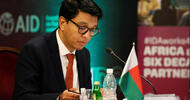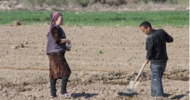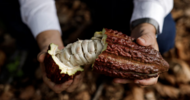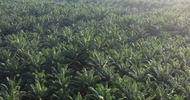If land is being unused or under-utilized in poor regions across Africa and Southeast Asia, outsourcing to capital-rich and land-poor nations could help prevent another global food crisis, but it must be fair and productive, Adam Wolfe writes for ISN Security Watch.
- ISN Security Watch
-
28 May 2009
"Saudi Arabia is increasingly looking for agriculture investment opportunities abroad, mostly in Africa," reports the US mission in Riyadh in May 2009
African countries are giving away vast tracts of farmland to other countries and investors almost for free, according to a report published by IIED, IFAD and FAO
- Financial Times
-
24 May 2009
Rich food importers are acquiring vast tracts of poor countries' farmland. Is this beneficial foreign investment or neocolonialism?
- The Economist
-
21 May 2009
Pakistan dramatically increased the amount of farmland open to foreign investors to six million acres, but will require outsiders to share half of their crop with local growers, Pakistan’s investment minister told Reuters.
Prof Hastings Okoth-Ogendo died last month hours after his groundbreaking draft, ‘Framework and guidelines on land policy in Africa’, was approved by a conference of African Union ministers of land and agriculture.
More important is for Africa to realise its own potential for food production, which would in the long-term negate the need for these deals.
- Global Dashboard
-
13 May 2009
On May 5, the Wilson Center hosted a half-day conference that considered the implications for investors, host countries, and food security, highlighting case studies from Asia, Africa, Europe, and the former Soviet Union.
- The New Security Beat
-
12 May 2009
Sovereignty trumps contractual obligations every time. If the African countries that are leasing their land fall into difficulties in feeding their own populations, as they are likely to do if world grain prices rise sharply, the first resource they will turn to is the foreign plantations on their territory.
Agriculture Secretary Arthur Yap said corporate executives representing the big agricultural businesses in Saudi Arabia have raised concerns about the Philippine agrarian reform and limiting foreign land ownership as they indicated interest in acquiring tracts of plantation land and poultry farms.
- Business Mirror
-
07 May 2009
The European Union is coercing some West African governments into allowing European-based fishing companies to deplete West Africa’s fishing stocks in a new "food colonialism" that is now taking place between rich and poor countries around the world, according to British author George Monbiot.
When the new Land Reform Minister rummaged through his office in Madagascar's capital, he was shocked to discover the documents for a $2-billion deal to lease huge tracts of farmland to an Indian entrepreneur.
- Globe and Mail
-
05 May 2009
Our government is planning to offer Arab investors legislative cover to protect them from changes in the government, but hardly any attention has yet been given to the need for protecting poor labourers who will be working for Arab corporate agriculture companies
After years of competing for overseas oil and mines, India and China are silently scouring the world for their next great need: farmland to grow food.
- Hindustan Times
-
04 May 2009
Neo-colonialists are buying up agricultural land in Africa – and local farmers could be crushed unless there are international rules to protect them.
- The Independent (UK)
-
03 May 2009
Foreign investors in overseas farmland “should not have a right to export” during a food crisis in the host country, a government-backed think tank is to propose on Thursday, in the first code of conduct to address the so-called land grabbing trend.
- Financial Times
-
28 April 2009
Growing food in foreign lands has a long history. But the 21st century version of outsourced agriculture presages something fundamentally new.
- Seed Magazine
-
27 April 2009
Saudi officials I have spoken to seem to be aware of the minefields their schemes could ignite.
- Financial Times
-
27 April 2009
The issue of food security is getting higher on Riyadh’s priority list.
GCC countries' initiatives to safeguard food security by investing in agricultural projects abroad had stalled, illustrated by the Saudi Bin Laden Group's decision to postpone a planned $4.3-billion investment in Indonesian rice production.
- Oxford Analytica
-
23 April 2009
Saudi Arabian investors want to lease 500,000 hectares of farmland in Tanzania to grow rice and wheat.
- The Citizen Newspaper
-
17 April 2009
Saudi investors have asked Tanzania if they can lease 500,000 hectares of farmland mainly for rice and wheat farming as part of a plan to secure food supplies for the desert kingdom, officials said.
Essentially, the Middle East is left with two choices. “The region has to import. The question is, invest abroad or rely on the free market?” said Dr Eckart Woertz, program manager in economics at the Gulf Research Center in Dubai.
An agricultural investment firm owned by the Saudi government will focus on investing abroad to cultivate mainly wheat, rice, sugar and soybeans, a senior agriculture ministry official said on Monday.
A group of private Saudi investors plans to invest 375 million riyals to plant wheat, barley and rice in Ethiopia
African states have actively encouraged Gulf investors into areas like agriculture, seeing them as a useful counterweight to China’s influence.
The Seychelles has cancelled a large new hotel development that was to be have been built on prime agricultural land, following strong objections from local residents worried about food security.
- The Guardian
-
01 April 2009
Saudi investors launched agricultural projects in Indonesia worth $1.3 billion last year, a top business official said on Monday, as the world's top oil exporter seeks to secure food supplies from abroad.
“The food crisis in the spring of 2008 was a warning sign,” according to al-Obeid. Saudi Arabia is a net importer of agricultural products, especially rice, corn and soya. This fact is pushing the state to invest overseas. We’ve sent government and private-sector delegations to Turkey, Ukraine, Egypt, Sudan, Thailand, the Philippines, Vietnam, Ethiopia and Uzbekistan. These delegations have been very warmly received.”
- Le Monde Diplomatique
-
16 Mar 2009
"Don’t tell me the Saudis grow food in Ethiopia to feed Ethiopians. Here is the conflict. Food shortage and famine is still rampant in today’s Ethiopia."















